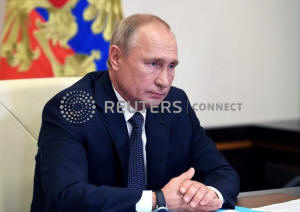U.S. loses Iran arms embargo bid as Putin pushes summit to avoid nuclear
deal showdown
 Send a link to a friend
Send a link to a friend
 [August 15, 2020]
By Michelle Nichols and Gabrielle Tétrault-Farber [August 15, 2020]
By Michelle Nichols and Gabrielle Tétrault-Farber
NEW YORK/MOSCOW (Reuters) - The United
States lost a bid on Friday to extend a U.N. arms embargo on Iran as
Russian President Vladimir Putin proposed a summit of world leaders to
avoid "confrontation" over a U.S. threat to trigger a return of all U.N.
sanctions on Tehran.
In a U.N. Security Council vote, Russia and China opposed extending the
weapons ban, which is due to expire in October under a 2015 nuclear deal
between Iran and world powers. Eleven members abstained, including
France, Germany and Britain, while Washington and the Dominican Republic
were the only yes votes.
"The Security Council's failure to act decisively in defense of
international peace and security is inexcusable," U.S. Secretary of
State Mike Pompeo said in a statement.
China's U.N. Ambassador Zhang Jun said in a statement after the vote
that the result "once again shows that unilateralism receives no support
and bullying will fail."

The United States could now follow through on a threat to trigger a
return of all U.N. sanctions on Iran using a provision in the nuclear
deal, known as snapback, even though President Donald Trump abandoned
the accord in 2018. Diplomats have said the United States could do this
as early as next week, but would face a tough, messy battle.
"In the coming days, the United States will follow through on that
promise to stop at nothing to extend the arms embargo," U.S. Ambassador
to the United Nations Kelly Craft said in a statement.
Diplomats have said such a move would put the fragile nuclear deal
further at risk because Iran would lose a major incentive for limiting
its nuclear activities. Iran already has breached parts of the nuclear
deal in response to the U.S. withdrawal from the pact and unilateral
sanctions.
Iran's U.N. Ambassador Majid Takht Ravanchi warned the United States
against trying to trigger a return of sanctions.
"Imposition of any sanctions or restrictions on Iran by the Security
Council will be met severely by Iran and our options are not limited.
And the United States and any entity which may assist it or acquiesce in
its illegal behavior will bear the full responsibility," he said in a
statement.
'THE ISSUE IS URGENT'
Putin on Friday proposed a video summit with the United States and the
remaining parties to the nuclear deal - Britain, France, China, Germany
and Iran - to try to avoid further "confrontation and escalation" at the
United Nations over Iran.
[to top of second column]
|

Russian President Vladimir Putin chairs a meeting with members of
the government via video link at the Novo-Ogaryovo state residence
outside Moscow, Russia August 11, 2020. Sputnik/Aleksey Nikolskyi/Kremlin
via REUTERS

"The issue is urgent," Putin said in a statement, adding that the
alternative was "only further escalation of tensions, increasing
risk of conflict - such a scenario must be avoided."
Asked if he would take part, Trump told reporters, "I hear there's
something, but I haven't been told of it yet." French President
Emmanuel Macron is open to taking part in a video summit, the Elysee
palace said.
The United States has argued that it can trigger a sanctions
snapback because a U.N. Security Council resolution enshrining the
nuclear deal named Washington as a participant. But the remaining
parties to the deal are opposed to the move.
Putin said Russia, an ally of Iran in the Syrian civil war, remained
fully committed to the nuclear deal and that the aim of a summit
would be to outline steps aimed at avoiding "confrontation and
escalation of the situation in the Security Council."
Trump has said he wants to negotiate a new deal with Iran that would
prevent it from developing nuclear weapons and also curb its
activities in the region and elsewhere. Trump, who has walked away
from a series of international agreements, has dubbed the 2015
nuclear deal - reached under his predecessor Barack Obama - "the
worst deal ever."

Diplomats have said several countries would argue that the United
States legally could not activate a return of sanctions and
therefore simply would not reimpose the measures on Iran themselves.
(Additional reporting by Alexandra Alper and Michel Rose; Writing by
Alexander Marrow; Editing by Hugh Lawson, Alistair Bell and Will
Dunham)
[© 2020 Thomson Reuters. All rights
reserved.] Copyright 2020 Reuters. All rights reserved. This material may not be published,
broadcast, rewritten or redistributed.
Thompson Reuters is solely responsible for this content. |